Developing nations around the world – rarely big emitters of carbon emissions – are ramping up their calls for radical global action to tackle the climate threat that is already looming large for low-lying countries.
As Vanuatu grapples with the fall out of category five Tropical Cyclone Pam which struck the Pacific nation on March 15, developing nations’ calls for action from high-emitting nations like Australia are being amplified.
At the United Nations Third World Disaster Risk Reduction conference in Sendai, Japan, calls to action from Vanuatu’s President and other highly exposed nations came at a grimly ironic time – March 14 to 18 – as Pam bore down on, then battered, the Pacific.
“Overnight a devastating disaster can wipe out years of development and reduce people [to]a state of increased poverty,” Baldwin Lonsdale, the President of Vanuatu, said at the conference.
"According to the World Bank report of 2012 it places Vanuatu on the map as the most prone country in the South Pacific region in all natural hazards such as earthquakes, volcanic eruptions, tsunami, drought, floods, landslides, tropical cyclones and impacts of climate change and rising sea level,” he said.
But as New Matilda reported earlier this week, a report by the Climate Council warned that tropical cyclones, at least, are expected to become more ferocious across the board.
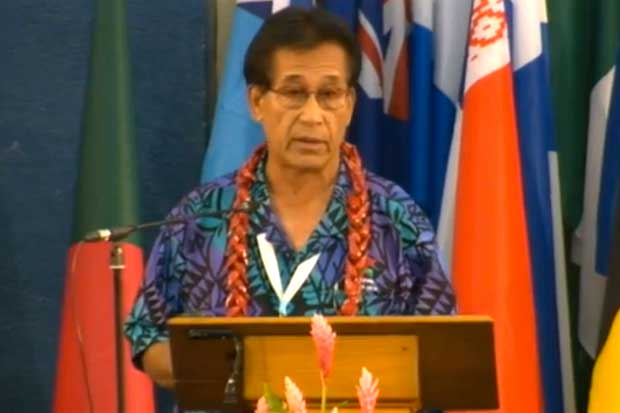
The President of the Micronesian states, Emanuel Mori (pictured above), traced this point when he gave impassioned pleas for climate action.
“Natural disaster and global warming brought about by human activity will lead to the same thing whether abruptly or gradually,” Mori Said.
“And that is the disappearance of our low lying islands.
“With the frequency of storms and their intensity exacerbated by climate change, prompt and effective actions are needed to save the vulnerable homelands of my people, and indeed those of many more islanders like us.
“I know that to the rest of the world the map looks pretty empty on this Pacific side of the globe,” Moris said, “but to all of us it is just as much a homeland as any continental land mass.
“Small island developing states must be treated accordingly and not just looked at as a small dot on the globe.
“There is no denying that there is an intertwined link between disaster and climate change – so the world must act, and act fast.
“Our actions must substantially reduced greenhouse emissions. We must stabilise them within an appropriate time frame and at the level that will reduce risks and protect our islands and the planet as a whole.”
“The sad fact,” Mori said, is that small island developing states are “at serious disadvantage in advancing the global agenda for disaster reduction” because of “inherent constraints” such as small, widely dispersed, populations and small land masses.
States like Mori’s have already been confronted with the costs of natural disasters – climate related or otherwise – and they are appealing to those countries that contribute most to the problem to do more to help fix it.
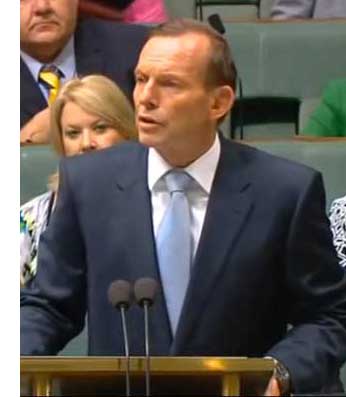
Australia’s Prime Minister, Tony Abbott (pictured right) has previously derided one such instrument – the UN controlled Green Climate Fund – as a “Bob Brown bank on an international scale” and “socialism masquerading as environmentalism”.
In an embarrassing back down, after the US pledged $3 billion to the fund, Abbott later committed Australia to a $200 million contribution, but that money was ripped directly from the already plundered foreign aid budget.
Australia is expected to announce the targets it will take to the crucial Paris climate talks in December mid-way through this year. The Climate Change Authority, a government-funded body which was established to advise the executive of the day, has recommended a 19 per cent cut by 2020 as a minimum.
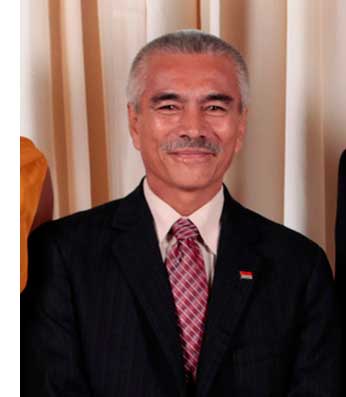
This is more than double the Abbott government’s current reduction target of 5 per cent on 2000 levels by 2020, and the Climate Change Authority has said any fair policy would blow out to between a 40 and 60 per cent reduction on 2000 levels by 2030.
To leaders of island nations like Kirabati, which neighbours Vanuatu and was also badly damaged by Cyclone Pam, those targets are tempered by the realisation that climate change is already having an affect.
“We are out of the hurricane belt,” Kiribati’s President Anote Tong (pictured right), told the conference last week, “we don’t get storms”.
“We have never really had disasters in that sense, we get slow onset disasters like drought, but nothing like what we have experienced recently,” he said.
“I have been on the long road talking about climate change over many years.
“It’s coming, it’s here now, in bigger terms than we ever imagined and so we are trying to deal with this.
“We are trying to cost all of that, we are trying to assess the damage, we’re trying to decide where to allocate the resources we believe we might be getting in order to deal with this, but I can guarantee you any reconstruction effort, any compensation, will never fully cover the damage.”
LAST year the United Nations Environment Program released a report warning that the climate change adaptation costs developing countries will have to face down globally by 2050 could be between US$250 billion and US$500 billion.
The Pacific region has had a small taste of this with Tropical Cyclones Sandra and Evan – in 2012 – costing $160 million and US$300 million respectively, and claiming dozens of lives.
But it is not just Pacific Nations that are threatened, as the Micronesian President pointed out. It is all developing nations that are not equipped to deal with the devastation.
The United Nations recently partnered with Bangladesh to accurately measure the costs the impoverished nation is already bearing.
The Bangladeshi government is spending six to seven per cent of its GDP on climate change adaptation measures annually, the UN said, which amounts to roughly $1 billion per year.
Ironically the average European citizen emits as much carbon in 11 days as the average Bangladeshi does in an entire year, yet it is the government and people of Bangladesh who are expected to shoulder the escalating cost.
Surprisingly, three quarters of the climate cost comes directly from the government, not international donors.
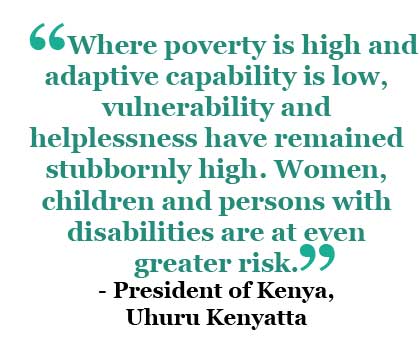
And it’s not just developing nations calling for action. Earlier this week a group of leading insurance companies – which control 15 per cent of the world’s premium volume and US$9 trillion in assets – called for stronger prevention measures.
Similarly, at the conclusion of the 15th African Ministerial Conference on the Environment, participating nations agreed on the Cairo Declaration, which calls on nations to work towards a commitment of limiting the global warm to less than 1.5 degrees on pre-industrial levels.
This target, significantly lower than the 2 degree target set at the 2009 Copenhagen climate talks which set the stage for this year’s talks in Paris, reflects the reality that Africa will also be amongst the hardest hit.
Even if temperatures were successfully limited to below 2 degrees, the UN has warned, 50 per cent of the African continent could be at risk of undernourishment, and adaptation costs could climb to $50 billion per year by mid-century.
Kenya’s President, Uhuru Kenyatta, said last week that preparedness, prevention, and resilience to natural disasters – which the UN now says are related to climate in more than 80 per cent of cases – are essential.
“Where poverty is high and adaptive capability is low, vulnerability and helplessness have remained stubbornly high,” Kenyatta said.
“Women, children and persons with disabilities are at even greater risk.
“Africa is a clear example in this case – extreme weather events such as droughts and floods have become a leading challenge to sustainable development.
“In Kenya and the Horn of Africa region, persistent droughts cause food insecurity, conflicts over dwindling water resources and general economic instability.”
AN ESTIMATED 155 million people have been displaced by natural disasters since 2008, and in the wake of Tropical Cyclone Pam the President of Seychelles, an island state near the Maldives, has repeated his calls for more to be done to stop vulnerable islands going under.
“Today it is the South Pacific, tomorrow it could be us,” President James Michel said.
For years he has led the charge for "ambitious targets on the basis of common but differentiated responsibility”.
Michel is pushing for any target to be legally binding and reflect the reality that anthropogenic climate change has been predominately fuelled by developed nations’ industrialisation.
However it’s not just already industrialised nations contributing to the problem – climate scientists have long warned that the industrialisation of rapidly developing economies like those of China and India are also paving the way to even more dangerous escalations in global carbon emissions.
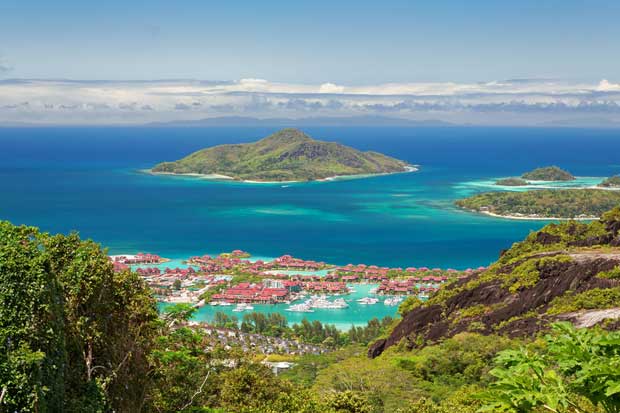
Earlier this month International Energy Agency (IEA) data revealed some rare good news on that front – for the first time in 40 years there was a halt in the world’s soaring greenhouse gas emissions that was not tied to an economic downturn and lower growth.
The IEA largely attributes the halt in emissions to China’s rapid transition – already well underway – towards a diversified energy mix of renewables like hydropower, solar, wind and nuclear.
But all countries, and especially developed nations, will need to reach an unprecedented and historically illusive international consensus at Paris to set the pace of retreat from fossil fuels that is necessary to save small developing island states and developing nations generally from rising sea levels and unmanageable natural disasters.
“In December in Paris, we have to agree to a universal, meaningful climate change agreement,” Ban Ki Moon, the UN Secretary General, said.
Donate To New Matilda
New Matilda is a small, independent media outlet. We survive through reader contributions, and never losing a lawsuit. If you got something from this article, giving something back helps us to continue speaking truth to power. Every little bit counts.




